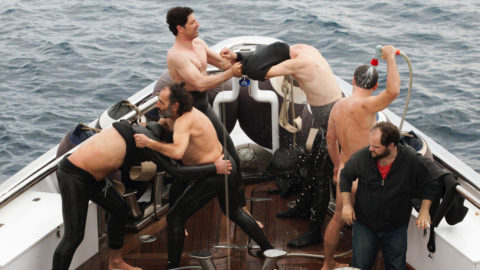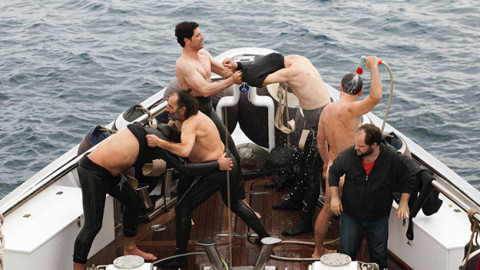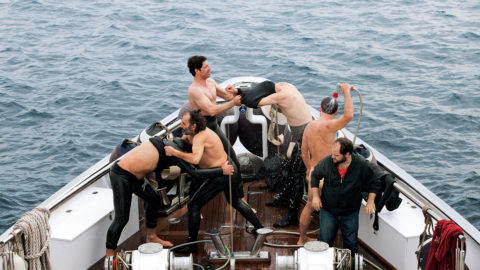Film of the Week: Suntan
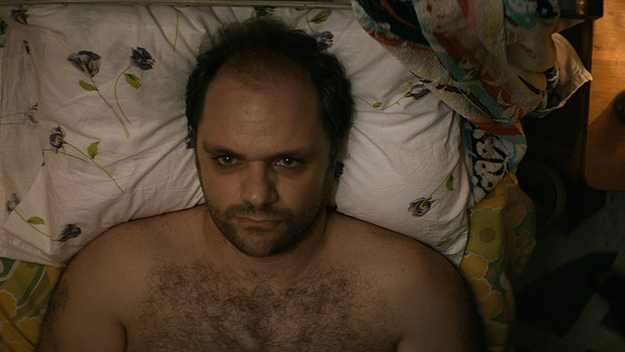
The Greek film Suntan ought to come accompanied by a warning to men over a certain age, and a certain weight. Make that a trigger warning, as some guys will emerge from the film feeling ready to shoot themselves. Women won’t feel much happier, either, given that Argyris Papadimitropoulos’s film offers such a desolate picture of men, their dreams, and their appetites. The solace that we can all take from Suntan, however, is that this is an extraordinary, exuberant, and inventive piece of cinema, and a finely crafted character sketch and essay in dark moral comedy. So unless you take the intransigent ethical view that a film’s achievements are entirely negated by its reluctance to offer much humanistic hope, then Suntan is definitely a film to see.
The poster tagline is bitterly apposite: “Some bronze, others burn.” It suggests that some people blossom as a result of their sexuality, while others are hopeless victims of their own desires. It might also suggest, rather despairingly, that there are those who seem naturally destined to flourish in the broad daylight of social interaction, while others—the disadvantaged, the excluded, those looked down on by the elite—must remain out in the cold, shivering even when they’re standing in the sun. Viewed that way, Suntan isn’t just a painful parable of male middle-aged lust, but a chilling exposé of privilege and deprivation: at heart, a story of class relations.
Scripted by Papadimitropoulos and Syllas Tzoumerkas—director of the bracingly intense 2014 drama A Blast—Suntan is, you might say, about a proletarian man trying to infiltrate a clique of gilded have-it-alls, young people blessed with looks, money, energy, leisure, and quasi-aristocratic self-assurance. It’s also a sort of Hellenic revision of Lolita, a book explicitly mentioned in passing. But this story’s golden girl isn’t as young as Lolita, nor is its lusting anti-hero as old, or as calculating, as Humbert Humbert. The latter is Kostis (Makis Papadimitriou), a 42-year-old doctor who arrives in winter to take up a new post on the Cycladean island of Antiparos, out-of-season population 800. A prelude shows us something you don’t often see—a holiday island in winter, with grey skies, perpetual drizzle, and an overall glumness close to those Greek landscapes that are usually the backdrops to Theo Angelopoulos’s films. Kostis has the demeanor to match—he’s balding, overweight, morose, and with a face that suggests a rushed attempt to carve John C. Reilly out of a potato.
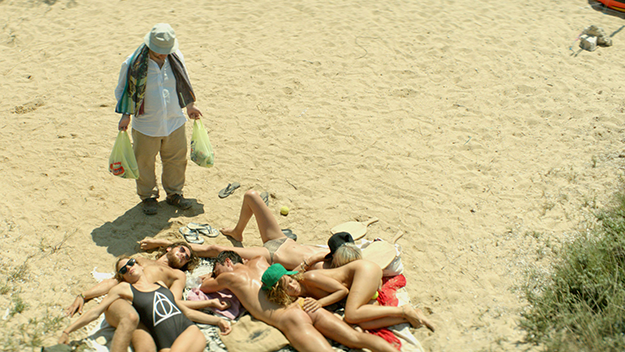
Nothing much happens on Antiparos in winter, and even it did, it doesn’t seem as if Kostis would have the will to partake. At a New Year’s party, he’s manifestly uninterested in joining the festivities—which suggests that he’s able neither to integrate into the community he’s joined nor to contemplate a future. Something has happened to derail his life, although just what is never spelled out.
Wait till summer, though, Kostis is told by sleazy would-be lothario Takis (Yannis Tsortekis), the island’s resident superannuated roaring boy; that’s when the holiday season brings an influx of “loads of pussy.” Kostis doesn’t look too interested, but when summer hits him, it hits him bad. Into his clinic one day walks, or rather hobbles, Anna (Elli Tringou), a 21-year-old beauty with a wounded leg. Accompanying her is a cosmopolitan gaggle of strutting young hedonists of mixed Nordic and European origin, who seem to have stepped out of a hyper-sexed Abercrombie and Fitch ad; they erupt into Kostis’s workplace, sniggering, twitching, flirting, generally reveling in their lack of concern for decorum. Kostis thinks they’re a pain, but is clearly tickled by their vivacity, and by Anna’s flirtiness. The minute he waddles down to one of the island’s hipper beaches to “accidentally” run into them—and sees Anna doing handstands in the water in her insouciant golden nakedness—his perdition is a done deal.
We can see from the start where Suntan is heading, but we can’t quite foresee the degree of emotional horror that’s in store. The story may, for some, defy credibility: you may not believe for a minute that the unsightly and altogether charmless Kostis might, even for the briefest moment, appeal to the woman of his dreams. Some might find it stretching a point that Anna’s friends are so loathsome, so loftily filled with contempt for their perceived inferiors. At a club, Kostis stares mesmerized at Anna kissing another woman. One of her female friends smirks at him—“Do you still get hard-ons?”—then, in reply to his aggrieved affirmative, delivers the brutally patronizing kiss-off, “Good for you.”
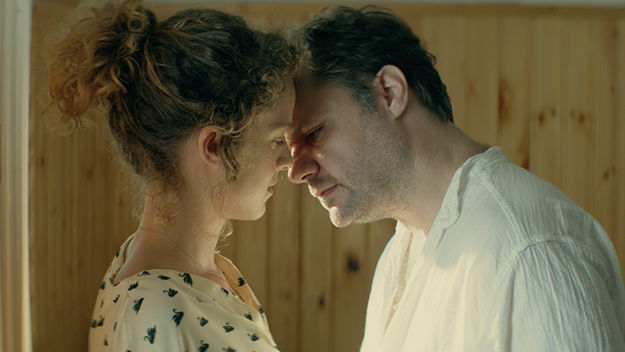
What’s at issue is an unforgiving politics of gender, age, and economic privilege. Anna knows the effect she’s having on Kostis and seems blithely indifferent to the torment she’s causing him—which could leave her looking like a flat stereotype of a “prick teaser,” or any of those terms that Nikos is likely to use on the women he targets. Anna and company show lofty indifference for anyone older (and, no doubt, poorer) than them: these visiting city youth see Kostis as an amusing local curio that they’ve picked up, and when he no longer amuses them, his feelings are of little concern.
Suntan could be read as a bitterly misanthropic, not to say misogynistic piece, as another horror story about a weak, besotted man and a heartless, narcissistic woman—it’s The Devil Is a Woman all over again, The Blue Angel gone Aegean. But what makes it different is the matter of where it’s set: this is a Greek story, and there’s something mythically timeless about the settings, especially in the scene where Kostis and Anna head to an unspoiled beach for a brief idyll à deux. As she swims under a flawlessly blue sky, she could be one of those nymphs that got Jack Palance’s movie producer so agitated while watching footage of Fritz Lang’s apocryphal The Odyssey in Godard’s Contempt. Both in Kostis’s perspective, and in the quasi-mythical context conjured by the film, Anna is Aphrodite, nothing less, and the way that she and her friends treat Kostis isn’t merely the snobbishness of a bunch of empty-headed young body fascists—it is the disregard of gods for humans. Repeated images of Kostis, staring lugubriously at a distance at the young folks on the beach, heighten the parallel: with his unshaven jowls and hairy paunch, he’s like a faun, a furry satyr, enviously watching immortals at play.
Kostis is clearly a lost soul from the start. It’s apparent that he’s come to Antiparos not to start a new life, but to bury himself. The moment he meets Anna, he embarks on a program of self-destruction; constantly abandoning his post to hit the beach, he broadcasts that the regard of his patients means nothing to him, and their well-being not much more. He has little prospect of pulling back from the brink, and his last night on the island ends the film with nothing less than a descent into hell for both him and Anna—with a chilling long take that reprises their first meeting, in a distinctly less joyful register.

I can’t think of many recent films that have so intensely, so ruthlessly, made use of their actors’ bodies. There’s an element of hard-nosed objectification in the way that Papadimitropoulos and DP Christos Karamanis film Anna and her gang as they get naked on every possible occasion, with their somehow innocent narcissism. But part of the strength of Elli Tringou’s performance is the brisk casualness with which her Anna consents to be objectified by Kostis’s deluded adoration, until it becomes inconvenient, and menacing. As for Makis Papadimitriou’s astonishing, vanity-defying characterization of Kostis, he uses his physique to self-lacerating effect—shambling along the beach in baggy shorts and sunhat, smearing himself with high-factor suncream that makes him ever paler as the film goes on, till he looks like a winter wraith. Even when Kostis is lost in rapture under the disco lights, it’s as if he’s borne heavily down by gravity—not just physical gravity, but the gravity of profound disappointment.
If you had to identify a prime image of abjection in cinema—an image of someone recklessly complicit in their own humiliation—you might well choose Kostis stumbling over the golden dunes holding a plastic bag and calling out, “Who wants some cold beers?” The first time he does it, the kids are all glad to see him; on the second occasion, he’s already become that sad old man with the beers, an unwanted hanger-on to be snubbed with extreme prejudice. It’s heartbreaking, even if Kostis is turning slowly into a monster. Papadimitriou is one hell of a good sport, to say the least—if you saw Athina Rachel Tsangari’s Chevalier, you’ll remember him lip-synching to Minnie Riperton’s “Loving You” and capping his rendition with an impish cartwheel.
What makes Suntan particularly sad is the discrepancy between the golden pleasures that the young people seem to embody and the tawdriness of the rewards that Kostis might expect, at best: a little condescending affection, as if toward a pet goat; a lightning-quick tumble if he’s lucky; and the kind of boozy bacchanalian larks that people seem willing to go halfway round the world for, at a particular age. But to be 42, or even 21, and spend your nights chugging metaxa to the sound of Martha and the Muffins? Even Odysseus’s lotus-guzzling sailors might have thought there were more fulfilling ways to pass a summer.
Jonathan Romney is a contributing editor to Film Comment and writes its Film of the Week column. He is a member of the London Film Critics Circle.



